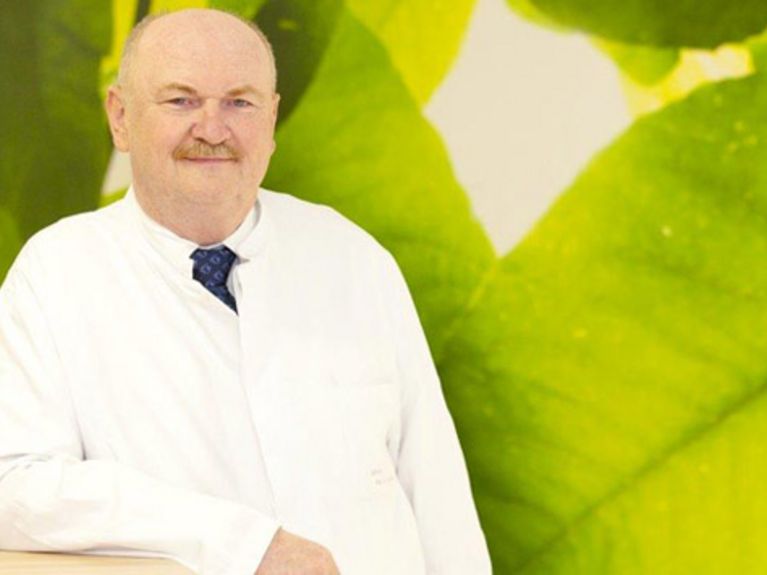Interview
Research for tailor-made therapies

Professor Michael P. Manns. Photo: Kaiser/MHH
Development of tailor-made therapies for patients with infectious diseases – this is the goal of the Centre for Individualised Infection Medicine founded in Hanover in December 2015. We had a talk with the founding Director Michael P. Manns.
Yes of course – and that already takes place whenever the doctor examines whether pre-existing conditions exist or if intolerances to certain drugs might be present. He then decides respectively how the patient should be treated. But today’s conventional therapies are for the most part tailored only to the general population. However, a specific drug is not as equally effective for every patient – some of them have strong side effects, or the therapy has no effect whatsoever. The individualised medicine offers more precise and more effective therapies that should be further researched researched and applied much more frequently in daily health-care practice.
How can medicine then become more individualised?
With the advances in the so-called Omics technologies such as Genomics, Proteomics or Metabolomics, it is possible today to characterise patients much more readily with the aid of various molecular analyses – for example, in the form of genetic sequencing, determination of proteins and/or protein patterns, metabolic products or immune parameters – and thereby predict the effectiveness as well as the undesirable effects of different therapy possibilities. In the context of large clinical studies, medically valuable and illuminating data, which are of huge benefit to the selection process for therapies, are ascertained through the application of bioinformatic correlations – in order to be able to treat more specifically while avoiding unnecessary therapies and side effects. For the patient, individualised medicine usually means nothing more than a blood sample –comprehensive diagnostic measures take place in the laboratory.
In which sectors is individualised medicine already being used today?
Individualised medicine is already considerably developed in cancer therapy. Nowadays tumour treatment is often times preceded by a molecular genetic analysis of the cancer cells, in order to be able to effectively combat the tumour with customised weaponry. For an increasing number of tumours, the individualised medicine has already become the standard procedure. In comparison, infection medicine is only at the beginning. However, even here successful treatment by means of individualised methods has been recorded.
Could you give us some examples?
One of the most important drugs used in HIV therapy leads to massive side effects for a number of patients. A certain genetic predisposition is responsible, which is accompanied by a high risk of side effects. This is why special genetic tests are carried out prior to the beginning of the therapy programme and, in the presence of an increased risk of these side effects, an alternative therapy is initiated. This has in the meantime become routine and an example for previously applied individualised infection medicine. A further example is Hepatitis-C therapy. Here as well, genetics is put under scrutiny – but not the patient’s; rather, the pathogen itself is analysed. Depending on the pathogen’s subtype, the respectively effective therapy is chosen, and the patient is selectively treated.
What are the opportunities in individualised infection medicine?
Particularly in infection medicine, the individual patient’s circumstances play a significant role. Age, pre-existing conditions, life-style, genetic and physiological conditions can influence the progression of the disease considerably. And the pathogens themselves can also be highly variable; they can induce either harmless or dangerous variants. There are many influential factors here that should be considered in the context of a systematic diagnosis. But big opportunities also emerge in the development of new tailor-made therapy procedures that facilitate individual and effective treatment of the patient.
What will be the key areas for research at the CIIM?
Our key areas are derived directly from the urgent infectiological problems and issues in the daily clinical routine, closely orientated to the patient groups and key areas of the MHH. We shall track the development of individualised treatment approaches in the areas of chronic infections, immune-compromised patients, as well as lung, lever and gastrointestinal infections. The main issue here is to identify patients with a high risk of severe disease progression or complication, and to enable optimal therapy. Currently the CIIM is still a virtual centre. In the immediate vicinity to MHH and TWINCORE (Centre for Experimental and Clinical Infection Research), a modern laboratory building is slated to be constructed in which research groups will be integrated in the future that will work with a clinical orientation at the CIIM, thus close to the patient.
What is your own vision of the individualised infection medicine of the future?
It should be possible in the future to produce, from each patient with an infectious disease, an individual profile, on the basis of which the best possible therapy can be generated. The pathway to this goal will take some time, but it will be quite exciting and certainly produce numerous step-by-step victories as well, which will further advance the development of individualised infection medicine. And, of course, I hope that we at the CIIM will be able to contribute a few things with our research efforts.
Readers comments